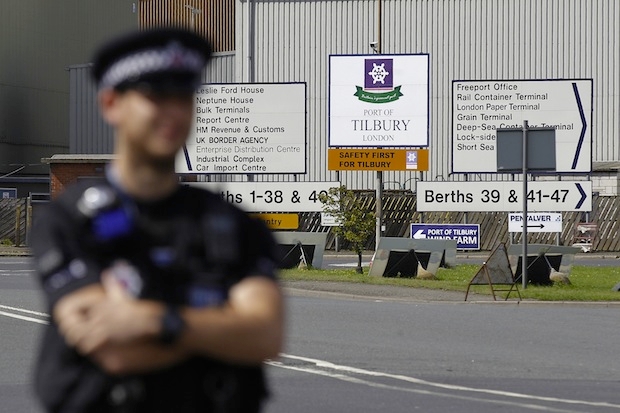The tale is now familiar: shouts are heard from inside a freight container and police are called. A cargo of human beings is discovered, some gravely ill. This happened last Sunday along the Thames at Tilbury docks. Thirty-five Afghans were discovered. One of them, Meet Kapoor, was already dead. Days later, 15 Kashmiris and Eritreans were found on a lorry pulled over in Somerset, dehydrated but alive. Dozens of people are now being found each week in these kinds of circumstances.
It is not just economic migration: the Afghans found in Essex were Sikhs, for example, a group singled out for repression under the Taleban. Once they must have hoped that a stable government would emerge in Kabul, allowing for the return of the 1.4 million Afghans still in exile. But this did not happen, and Britain and America are pulling out, leaving a weak government. The Taleban is now so strong that it is focusing its attentions on Pakistan (and killing policemen in Karachi). Meanwhile, the jihadists in the so-called Islamic State are telling Christians to convert or face the sword.
Had police found Romanian stowaways in Essex, they could have been deported immediately, the case treated as pure criminality. But those on the run from religious persecution are a different matter: Britain has an obligation to protect them. That so many risk their life for the chance to start at the very bottom in a country like Britain is a humbling reminder of the privileges and liberties that we can so often take for granted. But it is also a reminder of our obligation to grant asylum towards the persecuted. It is an obligation that the coalition government keeps strangely quiet about.
Ministers like to boast about the cash they are spending in overseas aid. The government has set a target for it — £12 billion this year — and officials spend their days in a panic trying to think where they can spend so vast a sum. (There is still talk of making the target legally binding, thereby making failure to hit it some kind of crime.) Much aid money does reach the right places: on page 13, Paul Wood describes sheltering with Yazidis under a tarpaulin bearing the inscription ‘From the British people’. But much goes to less deserving causes, such as teaching ‘low carbon agriculture’ to Colombian farmers or building wind farms in Uganda.
It sometimes seems as if ministers believe the generosity of this spending absolves them from other duties — such as providing asylum and help with resettlement. When the scale of the Syrian civil war became apparent, Cameron’s government pledged more aid money than the rest of Europe put together. But only seven months ago did we set up a ‘vulnerable person relocation scheme’ for Syrians — and by the start of last month, it had processed just 50 people. No one is suggesting we take in the 2.9 million registered Syrian refugees, but we ought to do better than relocating a few dozen.
Justine Greening, the International Development Secretary, is right to say that it is far better to deal with refugees in the area that they come from. The overwhelming majority of Syrians sheltering in Lebanon and Turkey will want to stay put, in the hope of returning. But as ever larger parts of the Middle East become no-go areas for Christians and other minorities, many have been forced to start looking for new homes. To its credit, the French government has offered asylum to persecuted Iraqi Christians. Australia’s government has said it will make 4,000 resettlement places available. Yet there has been no promise from Britain, except for the official line that we judge asylum on a case-by-case basis.
We have ended up taking a strangely small share of the burden. We now accommodate less than 1 per cent of the world’s displaced people; less than Sweden, whose government is a quarter the size of ours. This is not about straining public services — asylum was granted to just 5,730 last year, a negligible figure compared to the 400,000 who settled as immigrants. And if taking in more refugees is expensive, the money can come from the aid budget. Ugandan wind farmers will have to do without.
[datawrapper chart=”http://cf.datawrapper.de/v3aGY/2/”]
In some regards, Britain ought to be more concerned than most. The persecution of Iraqi Christians is an indirect consequence of deposing Saddam Hussein. We helped remove Colonel Gaddafi, but were less interested in helping Libya create a stable government. The resulting chaos has now led Libyans to flee to Italy and Malta in boats that are not necessarily up to the journey.
Now asylum seekers are coming here in ever greater numbers and taking ever greater risks. Security should be stepped up accordingly: we need more X-ray machines and heat-seeking scanners at Dover. But refugees with a well-founded fear of persecution, be they Afghans persecuted for their faith or Sudanese persecuted for their sexuality, should not have to rely on people-smugglers. If the Prime Minister were to follow the example of Tony Abbott in Australia and make it clear that he will accommodate those in genuine fear of persecution, fewer genuine refugees would die attempting to come here.





Comments